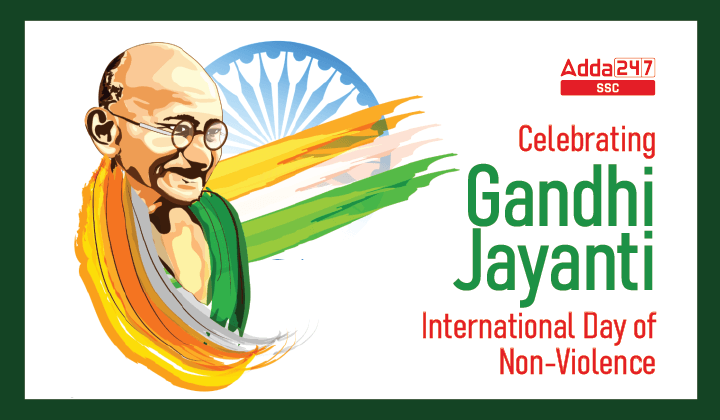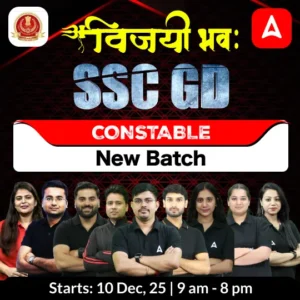Every year, the 2nd of October is celebrated as Gandhi Jayanti to commemorate the birthday of “Father of the Nation”, Mohandas Karamchand Gandhi. This day is also celebrated as International Day of Non-Violence as declared by the United Nations General Assembly on 15 June 2007. Gandhi Jayanti is celebrated in honor of the birthday of the Father of the nation, Mohandas Karamchand Gandhi, popularly known as Mahatma Gandhi or Bapuji. Internationally, this day is celebrated as the International Day of Non-Violence as Gandhiji was the preacher of non-violence. He is a symbol of peace and truth.
Early Life and Works of M.K. Gandhi
- Mohandas Karamchand Gandhi was born on 2 October 1869 into a Gujarati Hindu Modh Baniya family in Porbandar.
- His father, Karamchand Uttamchand Gandhi (1822–1885), served as the diwan (chief minister) of Porbandar state.
- In May 1883, the 13-year-old Mohandas was married to 14-year-old Kasturbai Makhanji Kapadia. The Gandhi couple had four children, all sons: Harilal, Manilal, Ramdas, and Devdas.
- He studied law in the UK and practiced law in South Africa.
- In April 1893, Gandhi aged 23, set sail for South Africa to be the lawyer for Abdullah’s cousin. In South Africa, he faced racial discrimination directed towards blacks and Indians. He faced humiliation on many occasions but made up his mind to fight for his rights.
- Gandhi questioned this unfair treatment and eventually managed to establish an organization named ‘The Natal Indian Congress in 1894.
- Gandhi was influenced by the idea of Satyagraha (devotion to the truth) and implemented non-violent protests around 1906. His struggles in South Africa helped him gain familiarity and initial acceptance in India.
- After 21 years in South Africa, he returned to India in 1915, touring the country on the advice of Gopal Krishana Gokhale.
- Gandhi’s deeds in South Africa gained him recognition in India.
- Key incidents like Champaran (1917), Kheda (1918), and the Ahmedabad Mill Strike (1918) established Gandhi as a political leader.
- In these events, Gandhi addressed the issues of marginalized Indians and advocated civil disobedience and non-cooperation.
- Gandhi provided leadership to all sections of Indian society in the struggle for freedom, regardless of caste, color, or creed.
Important Movements Started by Mahatma Gandhi
- Non-Cooperation Movement: One of the first series of non-violent protests nationwide was the non-cooperation movement started by Mahatma Gandhi. This movement officially started in the Gandhian era in India. In this freedom struggle, the non-cooperation movement was basically aimed at making the Indians aware of the fact that the British govt could be opposed, and if done actively, it would keep a check on them. Thus, educational institutions were boycotted, and foreign goods were boycotted. Indians awakened to the concept of going against the British.
- Civil Disobedience Movement: Gandhi embarked on another nonviolent campaign known as the civil disobedience movement. This movement proved to be even more dynamic than the non-cooperation movement and sparked a significant transformation. Its primary objective was to halt British administration by withholding support across various fronts. Protests erupted against issues like land revenue, the abolition of the salt tax, reductions in military spending, and the imposition of duties on foreign cloth, among others. A particularly pivotal moment within this movement was the Salt Satyagraha, during which Gandhi led the Dandi march as a form of protest against the salt tax.
-
Quit India Movement: The Quit India Movement was launched under the leadership of Mahatma Gandhi in August 1942. The main aim of launching this movement was to bring the British to negotiate with the Indian leaders. It was a call for immediate independence of India and the slogan of “Do or Die” was adopted for the same. However, the leaders were arrested soon after Gandhi’s speech and were put in jail by British officials. Gandhi went on a fast for 21 days demanding the release of the leaders despite his failing health. The British had to secure the release of the leaders.
-
India’s Independence: Following the Quit India Movement, the Indian freedom struggle intensified significantly, igniting a profound passion for independence. India stood united in its relentless pursuit of freedom, with individuals making diverse contributions to the cause. The resounding demand for Purna Swaraj, signifying absolute independence, echoed across the nation. After immense sacrifices and unwavering efforts, India finally achieved its long-cherished independence on 15 August 1947.
Famous Quotes By Mahatma Gandhi
Mahatma Gandhi is revered the world over as one of history’s most transformative and inspirational figures. Throughout his life in South Africa and India, Gandhi was a fearless campaigner for the rights and dignity of all people, whose constant and unwavering promotion of non-violence as a tool to win over hearts and minds has forever left its mark on the world. Here are some of the most famous and popular quotes by Mahatma Gandhi.
- “You must be the change you wish to see in the world.”
- “The weak can never forgive. Forgiveness is the attribute of the strong.”
- “An eye for an eye only ends up making the whole world blind.”
- “Live as if you were to die tomorrow; learn as if you were to live forever.”
- “Happiness is when what you think, what you say, and what you do are in harmony.”
- “First they ignore you, then they laugh at you, then they fight you, then you win.”
- “You must not lose faith in humanity. Humanity is an ocean; if a few drops of the ocean are dirty.”
- “The best way to find yourself is to lose yourself in the service of others.”
- “Strength does not come from physical capacity. It comes from an indomitable will.”
- “A man is but the product of his thoughts; what he thinks, he becomes.”



 Upcoming Government Exams, Complete Govt...
Upcoming Government Exams, Complete Govt...
 Govt Jobs 2025, Latest Upcoming Governme...
Govt Jobs 2025, Latest Upcoming Governme...
 SSC Exam Calendar 2025–26 Out, Check All...
SSC Exam Calendar 2025–26 Out, Check All...









